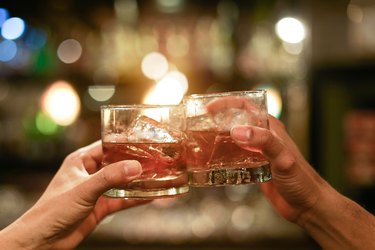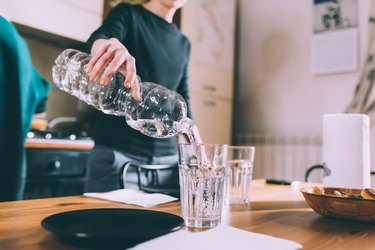
You may lament about a pounding head, dry mouth and the overall feeling of sluggishness that comes after one too many drinks. However, one side effect you may not be texting your friends about: diarrhea.
Getting the runs after drinking is a common side effect for a number of reasons, but there are simple ways to prevent it from happening (or treat it if you're reading this during a current episode).
Video of the Day
Video of the Day
Here's what you need to know about why you get diarrhea after drinking alcohol and how to feel better fast.
What Causes Diarrhea After Drinking Alcohol?
Diarrhea is typically caused by something in the diet that is consumed in excess — usually too much of a sugar or chemical substance, per the International Foundation for Gastrointestinal Disorders. So drinking too much alcohol can cause loose stools the next day.
"The way the gastrointestinal tract is affected by alcohol is multifactorial," says Lisa Ganjhu, DO, a gastroenterologist at NYU Langone Health.
"Loosened stools could be caused by increased fluid intake or the relaxation component of alcohol. Drinking alcohol also causes changes in the microbiome, or your gut bacteria, on a microscopic level and leads to inflammation in the colon."
Alcohol even inhibits the release of the antidiuretic hormone (ADH), which, in turn, increases your urine production and can lead to the dehydration you experience during a hangover, per Oregon State University. When food moves through your system too fast and doesn't have time to absorb liquid, it can also lead to diarrhea.
Drinking booze can also affect the mucous membranes that line the upper gastrointestinal tract in a way that can lead to diarrhea, per a classic 1997 review in the journal Alcohol Health & Research World. Alcohol may impair the muscle movement in the small and large intestines, contributing to diarrhea.
Did You Drink Too Much?
Getting diarrhea after drinking could be a sign you've had too much alcohol. "We tend to drink more than we should, and it's not very healthy," Dr. Ganjhu says.
Most people who drink excessively aren't necessarily dependent on alcohol. It might be easy to rack up the drinks without realizing it: Moderate drinking is defined as up to one drink per day for women and up to two drinks a day for men, according to the U.S. Centers for Disease Control and Prevention (CDC).
What's more, even moderate drinking can lead to small intestinal bacterial overgrowth and cause gastrointestinal symptoms like diarrhea, bloating, gas, abdominal pain and constipation, per an October 2011 study in the American Journal of Gastroenterology.
Does the Type of Alcohol You Drink Make a Difference?
Beer and wine may make you particularly susceptible to diarrhea the next day, per the International Foundation for Gastrointestinal Disorders.
An increase in fluids may also affect your bowel movements, so having a large beer might raise your risk of diarrhea more than having a smaller glass of alcohol, Dr. Ganjhu says. High sugar content in certain drinks may also contribute to diarrhea.
"Not all alcohol is created equal," says Dr. Ganjhu. "Theoretically, what the alcohol is made from could make a difference. But when it comes down to the microscopic level, alcohol is alcohol."
Certain People Are at Higher Risk for Diarrhea
Certain groups are at higher risk of gastrointestinal distress from alcohol, including those with Chron's disease and ulcerative colitis.
Alcohol can irritate the lining of the gastrointestinal tract and cause malabsorption and bleeding in these groups, per the Crohn's & Colitis Foundation.
Those who have celiac disease may also have trouble drinking certain beverages that contain gluten. If you have celiac disease, look for alcoholic drinks that are naturally gluten-free — like wine or vodka made from potatoes.
It's best to avoid gluten-removed beer since it's difficult to confirm whether it's actually gluten-free, per the University of Chicago Medicine.
Can You Prevent Diarrhea Before a Night of Drinking?

Your best bet for avoiding diarrhea after drinking is to drink in moderation and to avoid alcohol altogether if you have a preexisting condition that puts you at risk for gastrointestinal distress from alcohol.
It's also important to stay hydrated as you drink and take breaks between each glass of alcohol.
"I tell my patients that if they're going to be drinking, try to alternate alcoholic beverages with non-alcoholic beverages like seltzer or water with lime in it," says Dr. Ganjhu. "This way, they're drinking and socializing but less likely to have the complications of over-drinking and getting dehydrated."
Snacking while you drink will also help to slow down the absorption of alcohol and its side effects.
How to Get Rid of That Hangover Stomach Ache
The most important thing is to drink plenty of water, especially since both hangovers and diarrhea can cause dehydration.
"Try mixing a teaspoon or so of sugar and lemon juice into some water for a rehydration cocktail to help your belly feel better," says Dr. Ganjhu.
Eat something to settle your stomach, but avoid anything too acidic, sweet or salty, which may stimulate an even greater response from your digestive system — especially if you're feeling nauseous.
Also avoid foods high in fiber to help control diarrhea. Helpful snacks to eat when you have diarrhea, per the University of Wisconsin Health, include:
- Bananas
- White rice
- White toast
- Mashed potatoes
- Peeled apples
- Plain bagels
- Eggs
- Yogurt with live cultures
- Caffeine-free tea
- Noodles
- Lean meat or poultry
After a single night of drinking, hangovers will go away on their own. However, you should see a doctor if regular hangovers are affecting your quality of life, per the Mayo Clinic.
Warning
Most cases of diarrhea also go away without treatment, but you should see a doctor if:
- Your diarrhea lasts more than two days without improvement
- You become dehydrated beyond the effects of your hangover (think excessive thirst, little or no urination, severe weakness or dizziness)
- You have severe abdominal or rectal pain
- You have bloody or black stools
- You develop a fever of more than 102 degrees Fahrenheit
Does Drinking Too Much Cause Long-Term Gut Issues?
Over time, drinking too much alcohol can lead to several chronic diseases and problems — including those related to your gut. These include cancers of the esophagus, liver and colon, plus digestive problems and liver disease, per the CDC.
Drinking too much can also lead to high blood pressure, heart disease, stroke, breast cancer, a weaker immune system, learning and memory problems, depression, anxiety, social problems and alcohol use disorders.
You can reduce the risk of these health risks (and the risk of getting the runs) by limiting the amount of alcohol you drink and speaking to your health care professional if you need help doing so.
- International Foundation for Gastrointestinal Disorders: "Common Causes of Chronic Diarrhea"
- Oregon State University: "The Pituitary Gland and Hypothalamus"
- Alcohol Health & Research World: "Alcohol’s Role in Gastrointestinal Tract Disorders"
- U.S. Centers for Disease Control and Prevention: "Alcohol Use and Your Health"
- The American Journal of Gastroenterology: "Moderate Alcohol Consumption is Associated with Small Intestinal Bacterial Overgrowth: 2011 ACG Presidential Poster"
- Crohn's & Colitis Foundation: "Substance Abuse"
- The University of Chicago Medicine: "What alcohol is gluten-free?"
- University of Wisconsin Health: "Eating Hints to Help with Diarrhea"
- Mayo Clinic: "Hangovers"
- Mayo Clinic: "Diarrhea"